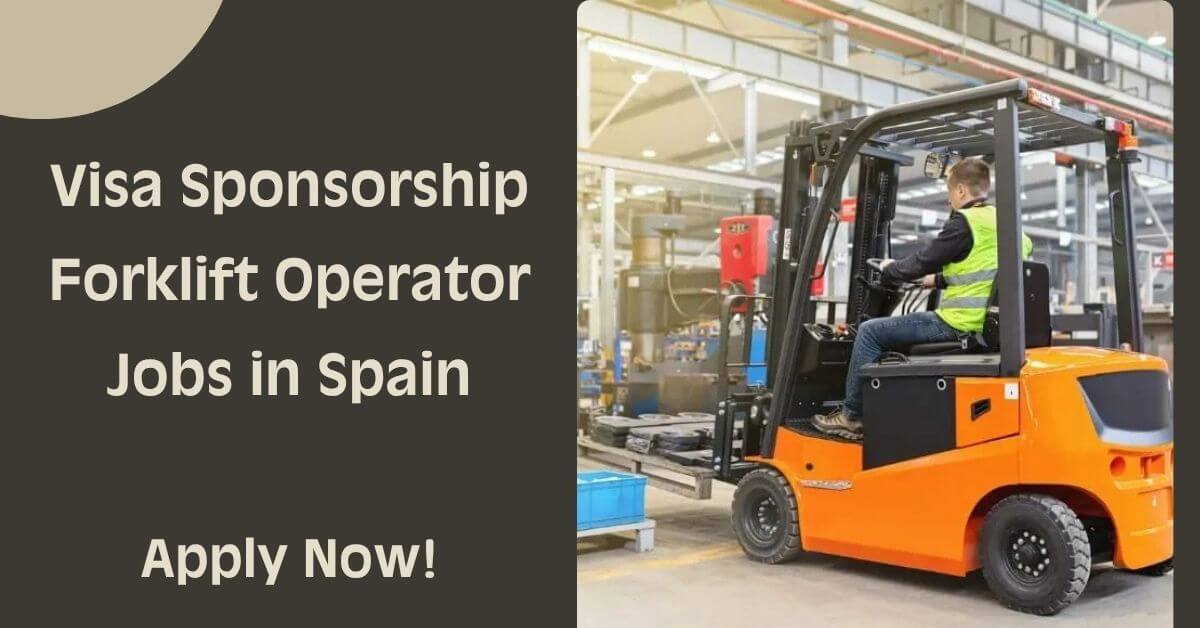Visa Sponsorship Jobs in Croatia for Foreigners 2025
Are you going to work in Panama as a foreign worker? The currency in Croatia is steady, and the country has a strong market economy with a big service sector. The country of Croatia, which is also called the Republic of Croatia, is in Southeast and Central Europe. It shares a shoreline with the Adriatic Sea.
If you are from an EU country, you don’t need a visa to live and work in Croatia. You will need a visa if you are coming from outside the EU. Usually, you need a job offer and funding from a company to get one.
This article will talk about the best reasons to work in Croatia, the recruitment agencies in Croatia, the jobs that will support your visa, how to get a job in Croatia as a foreigner, and a lot more.
Check Also: Visa Sponsorship Jobs in Scotland – Apply Now
Visa Sponsorship Jobs in Croatia for Foreigners:
- IT Support Specialist
- Junior Trader
- Production Operator Subassemblies
- Product Manager
- Growth Product Manager
- Senior Marketing Strategist
- Senior Manager, Partnership Marketing
- Product Designer
- Agile Program Manager
- Senior Product Manager
- Senior Growth Product Manager
- Engineering Manager, Data Engineering Team
- Senior Director of Product Management
- Senior Software Engineer in Test
- Senior Director of SEO
- Senior SEM Manager
Benefits of Visa Sponsorship Jobs in Croatia for Foreigners:
- Legal Authorization: Getting a job that will support your visa is the only way to be sure you can legally work in Croatia. This takes away the worry of working without a permit and makes sure you follow all immigration laws.
- Employment Stability: Visa sponsorship gives foreigners a stable way to work, usually through formal employment contracts that spell out rights, duties, and standards of the job, which gives them a sense of security.
- Cultural Immersion: People from other countries can fully experience Croatia’s rich culture, language, and customs by working there with a visa sponsor. This first-hand experience helps people understand and appreciate other cultures, which is good for personal growth and raising knowledge around the world.
- Career Development: Visa-sponsored jobs often offer chances to move up in your work and improve your skills. Foreigners can improve their applications, learn new skills, and make new connections, which can lead to better job opportunities in Croatia and around the world..
- Financial Security: There are a lot of jobs in Croatia that will sponsor your visa that pay well and come with perks like health insurance, housing allowances, and help with transportation. This makes sure that foreign workers are financially stable and healthy.
How to Get a Job in Croatia:
First, you need to find out if you are eligible for a Croatian work visa. More information is given below. You can look for work in person or online, but it’s best to sign up with recruitment firms first.
Some companies in the area and recruiters from other countries hire people who speak English. There are a lot of casual jobs, short-term jobs, and long-term jobs available. In Croatia, people often work part-time on farms, in agriculture, at language schools, in hotels, at holiday resorts, or for travel and tourism companies.
Work visa categories in Croatia:
People who want to work for you in Croatia will need both a work permit and a housing permit. Croatia is a part of the EU, which means that most Europeans can live and work there without a visa. If your employees are not from the EU, they will need to get a work permit at the Republic of Croatia diplomatic office in their home country.
The majority of work and residency permits in Croatia are valid for 12 months. People who want to work in Croatia can extend their work visa for at least 60 days before it ends if they need to. Croatia is part of the EU Blue Card network, which helps people from other countries since the Blue Card is only good for two years.
A work and residence pass combination is the most common way for workers to get a work visa in Croatia, but people may also be able to get a job registration certificate. People who work as advisors, artists, writers, or pastors often get these diplomas.
Conditions for Obtaining Work Visas for Croatia:
In the past, Croatia had a quota system for work and residency permits. This meant that applicants could only be given a work permit if the country’s limit was being met. The limit system is no longer in use as of January 1, 2021. Employers must first contact Croatia’s employment service (HZZ) to find out if there are any unemployed Croatians who are qualified for the job.
This is required by the new Foreigners Act, which controls how non-EU nationals can enter, stay, and work in Croatia. Otherwise, if the study doesn’t turn up any good candidates, the company may go ahead and apply for a work and residence visa for a foreigner.
The following documents must be shown by all candidates:
- their passport photocopy.
- the size of a passport.
- evidence of their independence while living in Croatia.
- proof of health coverage.
- an agreement for employment.
- evidence of academic credentials and abilities.
- evidence of the registration of their business.
People from outside the EU who want to work in the EU must have either a bachelor’s degree or five years of senior job experience. Candidates must also have either a confirmed job offer or an active work contract. Member states often speed up the process of applying for a Blue Card, which makes it faster than the normal process for work and resident permits.
Application Process:
How to apply for a work visa in Croatia depends on the type of visa you need and the rules of the office in your country. Some embassies, for example, don’t require appointments and work on a “first-come, first-served” system.
To start the process, a person must go to the administrative police station closest to where they live in Croatia or the Croatian embassy or consulate in their home country. After that, they have to apply along with all of the above papers. When the person gets the work and residence permit, they have to pay 870 kunas for the permit itself, a separate biometric residence permit, and processing costs. After all the bills are paid, Croatia will send the employee a residency pass. After 21 days, the employee can pick it up at the police station.
More Key Points:
People with an EU Blue Card can visit Croatia with their family, including their spouse, children, and other dependents. People with a normal work and residency visa, on the other hand, need to plan for their family members to visit Croatia. During this process, which should be done at the local consulate, you will need to show a copy of a legal travel document, proof of relationship, proof of funds, and proof of enough health insurance.
Top Reasons to Work in Croatia:
Do you want to live and work in Croatia? You may have fallen in love with the country while on vacation there, or you may just be looking for a place to move to where the cost of living is low and the quality of life is high. Croatia is a small, beautiful country that gets a lot of tourists.
Croatia is one of the best places in Europe to find work, and more and more people from other countries want to move there. It is pretty safe here and the cost of living is pretty low, especially when you compare it to nearby countries like Austria and Italy.
How may a foreigner get employment in Croatia?
People from other countries can look for work in the Republic of Croatia.
- Through the Croatian Job Service (HZZ), with the help of employment advisers, or through the website “Labour Exchange.” Web-based job mediation services.
- Newspaper ads are a form of advertising.
Best Places to Get Employment:
You can visit many places in the country, but the best places to find work are in the bigger towns, cities, and vacation spots, like Zagreb, Split, Rijeka, Osijek, Zadar, and Dubrovnik. Some summer and farming jobs may be in parts of the country that are pretty far away.
Summer Jobs in Croatia:
Are you looking for casual work in Croatia? There are jobs offered in many areas, such as teaching, sports, tourism, hospitality, and more. This area hires a lot of foreign workers during the summer to work at summer camps, teach English, or in the travel and tourist industry.
Professional Jobs in Croatia:
Some of the most important industries in Croatia are tourism, energy, pharmaceuticals and life sciences, building, and shipping. Tourism is the country’s main business, employing thousands of people and adding 20% to the GDP. Multinational companies are mostly based in bigger towns like Zagreb.
Recruitment Agencies in Croatia; Top Agencies
To secure employment in a developed nation such as Croatia, you must consult with one of the Croatian staffing companies. These entities can also assist if you require personnel.
It is feasible to locate employment in Croatia that is both financially advantageous and conducive to residence. Recruitment agencies in Croatia provide a diverse selection of employment opportunities in both IT and non-IT sectors.
People from numerous countries have become more interconnected as technology has advanced. Croatians and individuals from other nations have been afforded numerous employment opportunities as a result of their membership in the European Union.
Here is a list of some of the best Croatian staffing firms.
- Derka
- Mediator Group
- Electus DGS D.O.O
- Info art. d.o.o
- Humble Hunters
- Professor d. O. O.
- Trenkwalder Privremeno Zaposljavanje
- KADUS ZAPOSLJAVANJE D.O.O
- AA Euro Group
- Selectio
Conclusion:
Foreigners can get visa-sponsored work in Croatia in a wide range of positions, from IT experts to marketing managers. People who want to work in Croatia will have a much easier time if they know about the different types of work visas, how to apply for them, and important things like language skills and the cost of living. With a strong economy and a wide range of industries, Croatia is a popular place for foreign workers looking for work.
For More Info:
Email Your CV, and We’ll Find the Best Pathway For you: info@sponsorshipjobs.pk
Frequently Asked Questions:
Is it simple to immigrate to Croatia?
If you are a citizen of one of the EU or EA countries, you can move freely to Croatia. You are not required to obtain a Croatian visa. A non-EU/EEA citizen. If your country of residence is outside the EU or EA, you must apply for a long-stay visa and a residence permit to move to Croatia.
How can a foreigner get a job in Croatia?
Since Croatia is part of the EU, most European citizens can live and work in the country without a visa. If employees are from outside of the EU, they’ll need to obtain a work permit through their local Republic of Croatia diplomatic mission. The duration of most Croatian work and residence permits is 12 months.
Is there a Croatian embassy in Pakistan?
Since there is no Croatian embassy or consulate in Islamabad, you can visit the closest Croatian diplomatic office listed below for more information: New Delhi (Embassy, 693.62 km)



